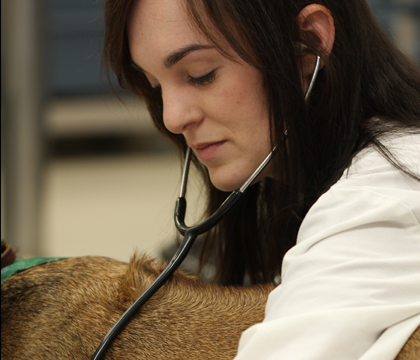
Parvoviral enteritis hard to stomach for pups
Parvoviral enteritis is a common condition affecting young dogs throughout most areas of the world. Often affecting puppies between the ages of eight to 20 weeks, canine parvovirus causes severe gastrointestinal abnormalities with profuse vomiting and diarrhea.
By Robyn Thrasher
Often fatal if not treated, parvovirus is transmitted through fecal-oral contact and can be extremely resistant in the environment — even in very cold Saskatchewan.
Dr. Anthony Carr, a professor of small animal medicine at the Western College of Veterinary Medicine (WCVM), sees at least 50 cases of parvovirus annually in the college's Veterinary Medical Centre (VMC).
With his main teaching responsibilities and research work involving clinical medicine and the gastrointestinal system, Carr shares his expertise on parvoviral enteritis.
Q. What happens in a dog infected with parvovirus?
Parvovirus attacks all rapidly dividing cells, including cells of the gastrointestinal tract and the bone marrow. Quite commonly, an infected dog has a very low white blood cell count resulting in severe suppression of the immune system.
If the infection isn't treated, death often occurs as a result of dehydration and electrolyte imbalance from fluid loss in vomit and diarrhea. Sepsis, a process where bacteria enter the bloodstream and spread throughout the body, is another common cause of death in these patients.
Q. How do you diagnose parvovirus infection?
Physical examination, vaccination history and bloodwork aid in pointing you in the right direction. A fairly quick and easy in-clinic test can also be used to detect the virus in a small sample of feces.
Q. How do you treat parvovirus infection?
Hospitalization with aggressive intravenous fluid therapy is standard for these patients. We also may give them quite powerful antibiotics. With little to no white blood cells, these dogs are highly prone to sepsis so they need antibiotics to combat this.
As well, medications to control vomiting are given and blood sugar levels are closely managed.
Q. What is the prognosis for patients infected with parvovirus?
With aggressive treatment and in the absence of concurrent infection with other viruses, bacteria or parasites, we generally have a survival rate of over 90 per cent.
Q. How can parvovirus infection be prevented?
Routine vaccination is one of the best ways to prevent parvovirus, though it can never be guaranteed to be 100 per cent protective.
Puppies should receive a series of vaccinations four weeks apart between the ages of eight to 16 weeks. A booster vaccine is given one year after the last vaccination in the puppy series. Depending on the vaccine type, boosters are continued annually or every three years.
It's best to minimize contact with other dogs until they're up to date on their vaccinations.
Another recommendation: avoid bringing an unvaccinated puppy into a household where there have been previous cases of parvovirus within the last few years.
Robyn Thrasher of Edmonton, Alta., is a third-year veterinary student at the WCVM. Robyn is a WCVM research communications intern as well as a summer student in the WCVM Veterinary Medical Centre during the summer of 2012.
Dr. Anthony Carr, a professor of small animal medicine at the Western College of Veterinary Medicine (WCVM), sees at least 50 cases of parvovirus annually in the college's Veterinary Medical Centre (VMC).
With his main teaching responsibilities and research work involving clinical medicine and the gastrointestinal system, Carr shares his expertise on parvoviral enteritis.
Q. What happens in a dog infected with parvovirus?
Parvovirus attacks all rapidly dividing cells, including cells of the gastrointestinal tract and the bone marrow. Quite commonly, an infected dog has a very low white blood cell count resulting in severe suppression of the immune system.
If the infection isn't treated, death often occurs as a result of dehydration and electrolyte imbalance from fluid loss in vomit and diarrhea. Sepsis, a process where bacteria enter the bloodstream and spread throughout the body, is another common cause of death in these patients.
Q. How do you diagnose parvovirus infection?
Physical examination, vaccination history and bloodwork aid in pointing you in the right direction. A fairly quick and easy in-clinic test can also be used to detect the virus in a small sample of feces.
Q. How do you treat parvovirus infection?
Hospitalization with aggressive intravenous fluid therapy is standard for these patients. We also may give them quite powerful antibiotics. With little to no white blood cells, these dogs are highly prone to sepsis so they need antibiotics to combat this.
As well, medications to control vomiting are given and blood sugar levels are closely managed.
Q. What is the prognosis for patients infected with parvovirus?
With aggressive treatment and in the absence of concurrent infection with other viruses, bacteria or parasites, we generally have a survival rate of over 90 per cent.
Q. How can parvovirus infection be prevented?
Routine vaccination is one of the best ways to prevent parvovirus, though it can never be guaranteed to be 100 per cent protective.
Puppies should receive a series of vaccinations four weeks apart between the ages of eight to 16 weeks. A booster vaccine is given one year after the last vaccination in the puppy series. Depending on the vaccine type, boosters are continued annually or every three years.
It's best to minimize contact with other dogs until they're up to date on their vaccinations.
Another recommendation: avoid bringing an unvaccinated puppy into a household where there have been previous cases of parvovirus within the last few years.
Robyn Thrasher of Edmonton, Alta., is a third-year veterinary student at the WCVM. Robyn is a WCVM research communications intern as well as a summer student in the WCVM Veterinary Medical Centre during the summer of 2012.
